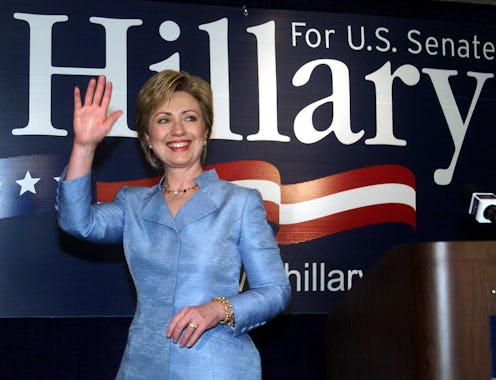News
3 Times Hillary Clinton Faced Sexism In 2016 Race
Former secretary of state and 2016 presidential hopeful Hillary Clinton has dealt with her fair share of sexism. After all, being a woman in power isn't easy, but it's especially hard when you've been at the heart of a number of controversies. But no matter how legitimate the criticism might be, there have been plenty of times Clinton has been called out for something that her fellow male politicians weren't, and that kind of unfair evaluation has long plagued the former first lady.
So far, Clinton is one of two women to enter the 2016 race. Carly Fiorina, a former Hewlett Packard CEO, is seeking the Republican Party's nomination, and the two likely face more unbalanced treatment compared to the male candidates in their parties. But what inequality has Clinton, the more well-known candidate out of the two, already faced?
Clinton has been confronted with a slew of sexist questions throughout her political career. She experienced sexist media coverage during her 2008 run for president, such as unfair comments about her age or physical appearance. In 2010, a reporter in Kyrgyzstan asked her, "What designers do you prefer?" and then admitted he wouldn't have asked a man the same question. For the 2016 election, Clinton has already been called out in areas where her fellow male candidates haven't faced the same scrutiny, and many of the criticisms have used sexist language or were based on sexist attitudes.
Being Advised On "How To Campaign As A Woman"
Maureen Dowd, a columnist for The New York Times, wrote an April 19 op-ed where she called Clinton a "granny" who "can't figure out how to campaign as a woman." Dowd also said Clinton "scrubbed out the femininity, vulnerability, and heart" in her 2008 campaign because she felt she needed to prove a woman could be commander-in-chief. Dowd's critique fell into the same trap of putting media expectations on female candidates. So far, no one has written a column about any of the male candidates and used their gender as justification to criticize their campaign styles.
Dowd then went on to say Clinton "saw the foolishness of acting like a masculine woman defending the Iraq invasion after she fell behind to a feminized man denouncing it." Dowd used Clinton's gender to criticize the former New York senator's stance on Iraq. Just compare that to the media's treatment of Jeb Bush, a possible 2016 Republican candidate, which instead attacked him and his brother, then-president George W. Bush, for lacking reliable information surrounding the invasion.
Being Criticized On How Much She's Been Paid For Speeches
A recent Washington Post article revealed Clinton and husband Bill have been paid $25 million for delivering 104 speeches since 2016. The Post article and other critics have blasted Clinton for blurring the "line between personal and political" by having close ties with companies who previously paid for speeches and now may be donating directly to her campaign. But this intense scrutiny appears unfair. The 2010 decision in Citizens United v. Federal Election Commission, which allowed candidates to form super PACs and accept unlimited contributions from corporations, union treasuries, and individuals, doesn't just apply to Clinton. It's unclear how this line wasn't already blurred by all candidates receiving money.
The Post wrote a separate story in 2013 and found that politicians being paid lucrative sums for speeches isn't rare. In 2007, when he was still campaigning to be president, former New York mayor Rudy Giuliani submitted a financial disclosure report listing a total of $9.2 million earned for public speaking engagements in 13 months. Why hasn't anyone looked into the speech history of other male candidates in this election? Furthermore, if the issue is about money, no one is really offering much outrage that conservative billionaires Charles and David Koch plan to spend $889 million on Republican candidates in the 2016 election — a number that'll make this campaign the most expensive in history, according to The New York Times.
Being Asked If She'll "Be Any Good"
Jason Zengerle recently wrote an op-ed for New York with the title "Is Hillary Clinton Any Good At Running For President?" Sure, it's a good question for Clinton, who lost her last White House bid, but it would be a good question for any other candidate. What about Huckabee, who also ran and lost in 2008? Why was it aimed only at her, and why didn't it evaluate whether other candidates would "be any good?" The question is pitched almost as a veiled way to probe about her ability to handle a presidential campaign rather than a direct question about her qualifications.
In another recent instance, Michael Gerson wrote an op-ed for the Post with the title "The Baggage Hillary Clinton Brings." The use of "baggage" should speak for itself because the word definitely isn't being used to describe the campaigns of any male candidates. Why haven't people scrutinized other candidates' past policies as thoroughly?
For example, Republican Texas Sen. Ted Cruz supported cuts to Planned Parenthood, which the state's health commission estimated would result in nearly 24,000 unplanned births between 2014 to 2015. Those unplanned births would then raise state and federal taxpayers' Medicaid costs by up to $273 million, according to Mother Jones. That's a pretty large bill for American taxpayers to foot as the result of a potential presidential candidate's decision, so why isn't Cruz being called out for it with similar op-eds?
Everyone, regardless of their gender, should be questioned for their past decisions. Clinton certainly isn't the only one in the race with "baggage," but she's the only one whose mistakes and flaws are being described that way.
Images: Getty Images (5)
